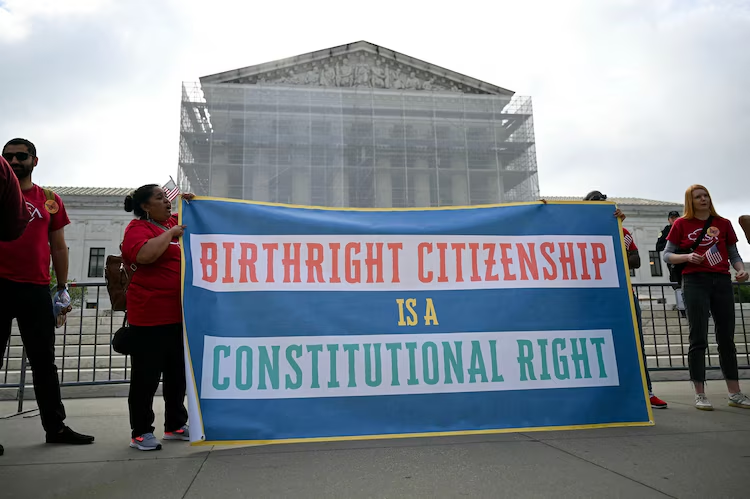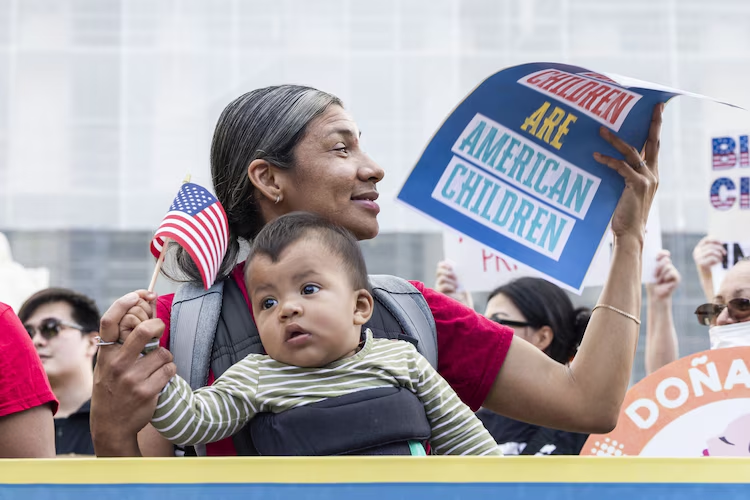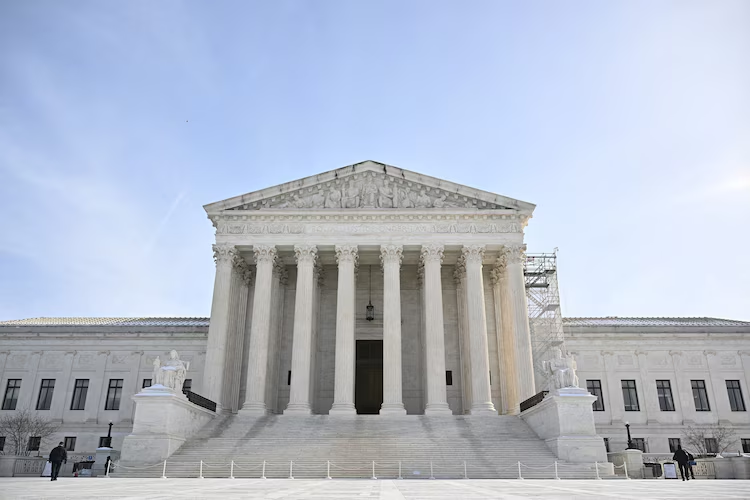Trump’s Order and the Legal Battle Explained
The question Can the Supreme Court end birthright citizenship? It has sparked intense debate across the United States. At the center is the Fourteenth Amendment’s Citizenship Clause, which guarantees citizenship to anyone born on U.S. soil. In 2018, President Trump issued an executive order aiming to end this long-standing practice for children born to parents with undocumented immigrants’ status.
This move triggered a complex legal battle that reached the Supreme Court, challenging decades of Supreme Court rulings and interpretations of the United States Constitution. Understanding this conflict is key to knowing how birthright citizenship could change and what it means for millions of people born in the U.S. and its territories.

What Is Birthright Citizenship and Why It Matters
Birthright citizenship means being a U.S. citizen simply because you were born in the country. It is also called citizenship by birth or birthplace-based citizenship. This rule is based on the idea of jus soli (right of the soil), which grants citizenship to those born within a nation’s territory. It contrasts with jus sanguinis (right of blood), where citizenship is inherited from parents.
This rule helps protect many groups, including children of undocumented immigrants and non-citizen nationals. It also supports civil rights by preventing statelessness for people born in the U.S. or its territories. Without birthright citizenship, many people could lose their legal protections and face challenges to their citizenship eligibility.
The 14th Amendment and the Citizenship Clause
The Fourteenth Amendment to the United States Constitution is the foundation of birthright citizenship. Its Citizenship Clause clearly states that anyone born or naturalized in the U.S. is a citizen. This clause was added after the Civil War to guarantee citizenship rights to formerly enslaved people and their descendants.
Over time, courts have upheld this clause. The famous United States v. Wong Kim Ark case confirmed that children born to foreign parents in the U.S. still qualify for citizenship. This Supreme Court precedent on citizenship protects the rights of millions. The amendment also applies to all people born subject to the jurisdiction of the U.S., which means they are not under diplomatic immunity or foreign rule.
Trump’s Executive Order to End Birthright Citizenship
In 2018, President Trump issued Executive Order 14156, which aimed to end birthright citizenship for children born to parents without legal status. The order claimed that the Citizenship Clause does not cover these children. Trump argued this move would help curb illegal immigration by removing a perceived incentive for parents to cross the border.
However, the order faced strong opposition. Critics said it conflicted with both the Fourteenth Amendment and longstanding citizenship and nationality laws such as the Immigration and Nationality Act (INA). The order also ignored decades of legal interpretation of citizenship and was seen as a political attempt to restrict rights for many families.
Legal Challenges and Supreme Court Proceedings
The executive order quickly led to lawsuits. Several states and civil rights groups challenged it, arguing it violated the United States Constitution. Courts issued injunctions to block the order from taking effect. The question reached the Supreme Court, which is now reviewing whether birthright citizenship can be limited.
This legal battle touches on many historic cases, including the Chinese Exclusion Act, the Indian Citizenship Act of 1924, and decisions like Lynch v. Clarke and the Dred Scott decision. Each case shaped the rules around who qualifies as a natural-born citizen. The Court’s ruling will set a powerful precedent, potentially reshaping citizenship rights.

The Controversy Around Nationwide Injunctions
One tool courts have used to block Trump’s order is the nationwide injunction. This means a court stops the order from applying anywhere in the country, not just in the lawsuit’s state. Supporters say nationwide injunctions protect constitutional rights across the U.S.
Opponents argue these injunctions give too much power to individual judges and disrupt the balance of government. This controversy highlights broader issues about how courts can influence immigration and citizenship rules. The debate over injunctions ties into wider political debates on citizenship and immigration law restrictions.
Potential Consequences of Ending Birthright Citizenship
Ending birthright citizenship would cause major changes. Millions of people born in the U.S. but to parents without legal status could lose their citizenship. This includes many children of undocumented immigrants and people born in U.S. territories like Puerto Rico and American Samoa citizenship status.
This change could increase the number of stateless individuals. It would also affect rights guaranteed under the Child Citizenship Act of 2000 and other laws. Economically, there might be fewer taxpayers and more legal confusion. Socially, the country could see more divisions around civil rights and citizenship.
Public and Political Reactions
Public reactions have been mixed. Some support ending birthright citizenship, believing it will reduce illegal immigration. Others see it as an attack on immigrant families and a violation of the Fourteenth Amendment. Politicians remain divided, reflecting sharp partisan splits.
Groups advocating for immigrant rights warn about the dangers of citizenship revocation proposals. Meanwhile, opponents stress the need to control borders and enforce immigration status laws. The heated debates show how citizenship touches on deep issues of identity and law.
Comparative Global Perspective on Birthright Citizenship
The U.S. is one of the few countries with unconditional birthright citizenship. Most nations follow jus sanguinis (right of blood), where citizenship depends on parentage. Countries like Germany and Japan do not grant citizenship based solely on birthplace.
Here is a simple table showing different citizenship systems:
| Country | Citizenship Basis | Birthright Citizenship? |
|---|---|---|
| United States | Jus soli (birthplace) | Yes |
| Germany | Jus sanguinis (parentage) | No |
| Japan | Jus sanguinis (parentage) | No |
| Canada | Jus soli (birthplace) | Yes |
| Mexico | Jus soli (birthplace) | Yes |
This global view helps understand why debates about birthright citizenship in the U.S. are unique and complex.
Can Birthright Citizenship Be Revoked or Changed?
Legally revoking birthright citizenship is extremely difficult. The Citizenship Clause in the Fourteenth Amendment strongly protects it. Changing this right would require either a new constitutional amendment or a major Supreme Court ruling overturning decades of historical citizenship cases.
Past attempts to limit birthright citizenship, such as laws related to the Chinese Exclusion Act or debates over Native American citizenship, show how hard it is to change this principle. Current legal scholars often argue that Trump’s order lacks a firm legal basis.
What’s Next? Future of Birthright Citizenship in the U.S.
The future of birthright citizenship remains uncertain. The Supreme Court’s decision will be critical. Lawmakers might try to pass new laws, but these could face constitutional challenges. Public opinion will also play a role in shaping the debate.
Whether the Court upholds or ends birthright citizenship, the outcome will influence millions’ lives. Staying informed and engaged on this issue is essential for anyone interested in citizenship rights of children born abroad and the broader meaning of American identity.
In conclusion, the question, Can the Supreme Court end birthright citizenship?, strikes at the heart of the nation’s values and laws. From the Citizenship Clause of the Fourteenth Amendment to modern political battles, this topic remains one of the most significant in U.S. law and society today. Understanding the history, laws, and potential consequences helps us grasp why this fight matters so much.
FAQs
Does a baby born in the USA get citizenship?
Yes, under the Fourteenth Amendment, almost all babies born on U.S. soil automatically gain birthright citizenship.
What is the difference between naturalized and birthright citizenship?
Birthright citizenship is granted at birth by being born in the U.S., while naturalized citizenship is earned later through a legal process.
Is birthright citizenship in the US Constitution?
Yes, the Citizenship Clause of the Fourteenth Amendment guarantees citizenship to anyone born in the U.S.
Can a U.S. born citizen give up citizenship?
Yes, a U.S.-born citizen can voluntarily renounce citizenship, but it involves a formal legal process.
Can you still live in the US after renouncing citizenship?
Renouncing citizenship means losing the automatic right to live in the U.S., so you would need a visa or residency status to stay.
“What to know about birthright citizenship as Supreme Court weighs blocks on Trump’s order to end it” ABC News
Read more about “US Supreme Court hears arguments on Trump’s order to end birthright citizenship”BBC News
Read our previous article: PGA Championship 2025 TV Schedule

Your blog has quickly become one of my favorites. Your writing is both insightful and thought-provoking, and I always come away from your posts feeling inspired. Keep up the phenomenal work!